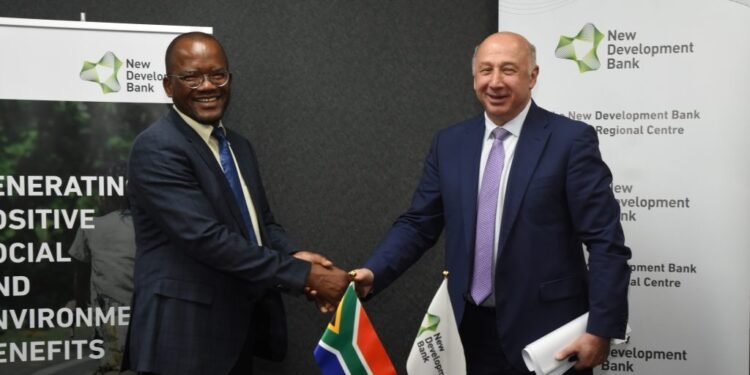New Development Bank (NDB) has signed a R3.2 billion loan agreement with the state-owned Trans-Caledon Tunnel Authority (TCTA) to develop infrastructure for Phase 2 of the Lesotho Highlands Water Project.
The deal was signed on the sidelines of the 15th Brics summit in Johannesburg, which commenced this week.
Read:
The total cost of the project, which broke ground in May, is R46 billion and involves the building of the Polihali Dam and transfer tunnel in Lesotho, as well as a bridge above the Senqu River. The project includes a 165 metre dam, a 38km water transfer tunnel, roads, bridges, and telecommunications infrastructure and a mini hydropower station that will benefit Lesotho.
“This funding from the NDB is for advance infrastructure such as bridges and roads,” said Percy Sechemane, CEO of the TCTA.
This is the first project financed by the NDB outside of the Brics countries, as Lesotho is not a Brics member. The project is being co-financed by NDB, African Development Bank and other financial institutions.
Other infrastructure projects
Vladimir Kazbekov, chief operating officer at the NDB, says the bank had approved $32 billion (R608 billion) in loans, of which 18% were in SA.
South Africa accounted for the highest rate of disbursements by the bank.
Among infrastructure projects under consideration are $75 million (R1.4 billion) for an upgrade of the Telkom communications network and $1 billion (R19 billion) for modernisation of Transnet’s infrastructure.
Phase 2 of the Lesotho Highlands Water Project will expand the existing water flow into the Vaal River Basin from 780 million cubic metres to 1.27 billion cubic metres a year by 2028. Feasibility studies for Phase 2 began in October 2005 and were completed in May 2008.
The NDB loan is guaranteed by the SA government.
‘Brics bank’ is growing
Other countries recently admitted to the NDB include Bangladesh, Egypt, the United Arab Emirates and Uruguay, which gives the bank enhanced ability to tap local markets for funding which could be used to fund in-country development projects.
Other countries keen to join are Algeria, Honduras, Zimbabwe and Saudi Arabia.
Read:
“We met with the minister of electricity [Kgosientsho Ramokgopa] and we are looking at what improvements could be made in SA to help with the electricity situation here,” said Kazbekov.
NDB president Dilma Rousseff, former president of Brazil, was also a former energy minister in that country.
Kazbekov says several other Brics member countries had transformed from state-owned energy monopolies and could share their experiences and hard-won knowledge with SA.
Addressing the issue of the de-dollarisation of Brics, Kazbekov said the NDB continued to reflect its balance sheet in US dollars, notwithstanding a significant proportion of loans made in local currencies.
Roughly two-thirds of the bank’s $32 billion loans are denominated in US dollars, though the bank is under pressure to offer more loans in local currencies. This appears to have been hindered by Russia’s war with Ukraine.
The NDB was established by Brazil, Russia, India, China and South Africa (Brics) to fund sustainable development projects in Brics and other emerging countries.
Read:
Phase 1 of the Lesotho Highlands Water Project commenced in the 1980s and involved the building of the Katse Dam in the Maluti Mountains with a 45km transfer tunnel, a 37km delivery tunnel, and the 72MW Muela hydropower station. It was completed in 2004 – and it was always anticipated that as demand for water in SA grew, an additional phase of the highlands water project would be built.
NDB issues R1.5 billion bond
Last week NDB issued its first ZAR bond in the SA bond market, making it the highest rated issuer in this market since 2015.
The R1.5 billion bond was well supported, with bids in excess of R2.5 billion for the three- and five-year tranches. This allowed the bank to upsize the bond from R1 billion to R1.5 billion.
Some 71% of bids were allocated to institutional investors, the remainder to local banks. The NDB says the bidding achieved the tightest spreads of any non-government issuer in the SA debt capital markets in 2023.
“The proceeds will be used to fund infrastructure and sustainable development projects in South Africa and the successful outcome sets the benchmark for future issuances by NDB,” says Leslie Maasdorp, the bank’s chief financial officer.
Listen to this Moneyweb@Midday podcast with Jeremy Maggs (or read the transcript here):
You can also listen to this podcast on iono.fm here.









